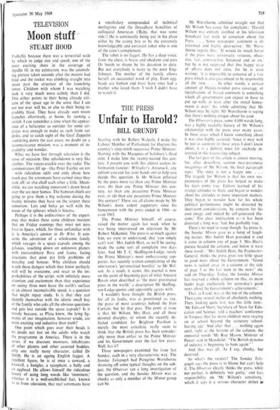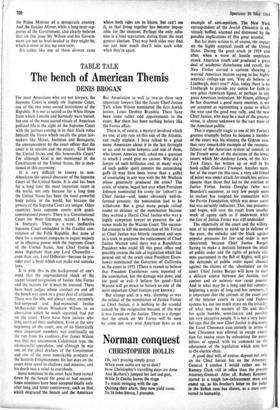Unfair to Harold?
THE PRESS BILL GRUNDY
Starting with Sir Robert Walpole, I make the Labour Member of Parliament for Huyton this country's sixty-ninth successive Prime Minister.
Starting with the Marquess of Salisbury's third stint, I make him the twenty-second this cen- tury. I present you with this almost useless in-
formation (source: Whitaker's Altnanack, any edition you can lay your hands on) to help you
decide this question. Is Mr Wilson pilloried by the press more (a) than any Prime Minister ever, (b) than any Prime Minister this cen- tury, (c) than any peacetime Prime Minister ever, or (d) than any peacetime Prime Minister this century? These are all claims made by Mr Wilson's more ardent supporters since his honeymoon with the press ended in 1966—or - even 1965.
The Prime Minister himself, of course, raised the matter again last week when he was being interviewed on television by Mr Robert McKenzie. The press is so much against him, we were to understand, that 'you simply can't win.' Mrs Judith Hart, as we'll be seeing.
made the same sort of complaint two days later. And Mr T. C. Skeffington-Lodge, surely the Prime Minister's most embarrassing sup-
porter, has recently written complaining of the SPECTATOR'S 'personalised hostility' to Mr Wil-
son. As a result, it seems, this journal is now on the point of becoming part of what Aneurin Bevan once described as 'the most prostituted press in the World,' a description Mr Skeffing- ton-Lodge quotes and apparently agrees with.
I wouldn't have thought the British press, for all its faults, was as prostituted as, say, the press of most countries behind the Iron Curtain; but let that pass. The point at issue is that Mr Wilson, Mrs Hart, and all those devoted disciples, of whom the recently de- feated candidate for Brighton Pavilion is merely the most articulate, really seem to think that the British press has been consider- ably more than unfair to the Prime Minister and his Government over .the last few years. Well, has it?
Three newspapers examined the issue last Sunday, each in a very characteristic way. The .
Sunday Telegraph had Peregrine Worsthorne throwing off some typical thoughts on the sub- ject, the Observer ran a long investigation of the question, and the Sunday Mirror was as cheeky as only a member of the Mirror group can be.
Mr Worsthorne admitted straight out that Mr Wilson has cause for complaint: 'Harold Wilson was entirely justified in his television broadcast last week to complain about the Press. . . . Some newspaper comment is ill- informed and highly destructive.' Mr Wors- thorne regrets this: 'It would be much better if the press were universally virtuous, objec- tive, fair, constructive, balanced and so on.' but he is not surprised that this happy state of affairs does not exist, for he is soon writing: 'it is impossible to conceive of a tree press which is also guaranteed to be responsible all the time. . . . In other words, a certain amount of bloody-minded press coverage, of trivialisation, of biased comment is something which all governments can expect to have to put up with, at least after the initial honey- moon is over.' So, while admitting that Mr Wilson may be right. Mr Worsthorne is saying that there's nothing unique about his case.
The Observer's piece, some 4,000 words long, was a highly readable history of Mr Wilson's. relationship with the press over many years.. In those areas which I know something about ' it was also highly accurate. Since it may well be just as accurate in those areas I don't know about, it is a definite must for anybody in- terested in this fascinating subject.
The last part of the article is almost moving, for, after describing various near-paranoiac imaginings of Mr Wilson, the final paragraph says: 'The story is not a happy one. . . . The tragedy for Wilson is that his own sus- piciousness of the press has helped to make his fears come true. Editors learned of his strange attitudes to them, and began to wonder • about his attitudes to more important matters. They began to wonder how far his whole political performance might be distorted by short-term' considerations, by concern for his own image, and indeed by self-generated illu- sions.' The clear implication is—it has been distorted a long way. Sad, but probably true.
There's no need to weep though. To prove it. the Sunday Mirror gave us a lump of laugh- ing matter. Mrs Judith Hart provided it and it came in column one of page 3. Mrs Hart's picture headed the column, and below it were these words: 'Mrs Judith Hart, the Paymaster- General. thinks the press gives too little space to good news about the Government. "Good news is tucked away in a column at the side of page 5 or the last item in the news" she said on Thursday. Today, the Sunday Mirror has reserved a whole column on this, its main leader page, exclusively for yesterday's good news about the Government's achievements.'
That, as I said, was at the top of the column. Then came several inches of absolutely nothing. Then, looking quite lost, was this little item: `Mr Edward Short, Secretary of State for Edu- cation and Science, told a teachers' conference in Torquay that far more children were staying on at school beyond the statutory school- leaving age.' And after that . . . nothing again until, right at the bottom of the column, the immortal words 'Mr Roy Mason, Minister of Power, said in Mansfield : "The British dynamo of industry is beginning to hum again."'
And that was all. As I say, cheeky, but deserved.
So what's the verdict? The Sunday Tele- graph says the press is to blame but can't help it. The Observer clearly thinks the press, while not perfect, is definitely 'not guilty,' and lays responsibility on `Mr Wilson's sensitivity,' which it says is a serious character defect in the Prime Minister of a democratic country. And the Sunday Mirror, while a long-term sup- porter of the Government, also clearly believes that on this issue Mr Wilson and his Govern- ment are not as level-headed as they might be, which is more or less my own view.
It's rather like one of those divorce cases where both sides are to blame, but can't see it, so that living together has become impos- sible for the moment. Perhaps the only solu- tion is a trial separation, dating from the next general election. That way both sides may find out just how much they'll miss each other when they're apart.



































 Previous page
Previous page